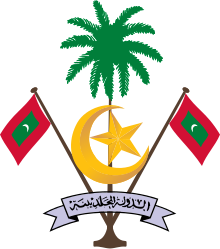

| English: National Salute | |
|---|---|
| ޤައުމީ ސަލާމް | |
 | |
National anthem of the | |
| Also known as | Gaumee Salaam |
| Lyrics | Muhammad Jameel Didi, 1948 |
| Music | Pandit W. D. Amaradeva, 1972 |
| Adopted | 1905 |
| Readopted | 1972 |
| Audio sample | |
U.S. Navy Band instrumental version (chorus and one verse)
| |
"Qaumee Salaam" (also called "Gaumee Salaam";[1] Dhivehi: ޤައުމީ ސަލާމް, IPA: [qaumiː s̺alaːm], "National Salute") is the national anthem of the Maldives. The lyrics were written by Muhammad Jameel Didi in 1948, and the melody was composed by Sri Lankan maestro Pandit Amaradeva in 1972.
"Qaumee Salaam" is a declaration of national unity, the country's Islamic faith, the victory of historic battles and an homage to the heroes who fell defending the nation. It also wishes further development on the country, while paying respect to the leaders who had served it.
Until 1948, a melody without lyrics called the Salaamathi was performed by a royal band on state occasions at the Etherekoilu, the residence of the Sultan. Soon after, it was decided that the Salaamathi needed lyrics accompanied by a new melody. The lyrics were written by a young poet and later chief justice, Mohamed Jameel Didi.[1][2]
Jameel Didi wrote the words for the new Salaamathi bearing in mind the influence of Urdu poetry during the time, closely imitating its style and also furnishing his work with words borrowed from Arabic. Afterwards, Jameel Didi began looking for a tune to accompany his poem when he heard the noon chime ("Auld Lang Syne") of his uncle's clock. The tune was adopted to the lyrics, and the new Salaamathi was complete.[1][2]
Throughout the 1950s and 1960s, Maldivians became more aware of the importance of a national anthem, and in 1972, shortly before the Maldives was visited by Queen Elizabeth II of the United Kingdom, the government hastily commissioned Sri Lankan maestro W. D. Amaradeva for a new melody for the anthem.[1][2][3] The original lyrics were retained, with a few changes to emphasise the fact that Maldives had been a republic since 1968.[2] As of 2022[update], this version of the anthem has survived without any modifications.
Normally, only the chorus and first two verses are sung.[4][5]
| Dhivehi (Thaana) original[6] | Nasiri romanisation | ISO 15919 romanisation | IPA transcription[a] | English translation |
|---|---|---|---|---|
ކޯރަސް |
Chorus: |
Kōras: |
Chorus: |
Chorus: |
|
Anthems of Asia
| |||||||||||||||||||
|---|---|---|---|---|---|---|---|---|---|---|---|---|---|---|---|---|---|---|---|
| National |
| ||||||||||||||||||
| States with limited recognition |
| ||||||||||||||||||
| Regional |
| ||||||||||||||||||
| In exile/ disputed |
| ||||||||||||||||||
| Organisations |
| ||||||||||||||||||
| Former |
| ||||||||||||||||||